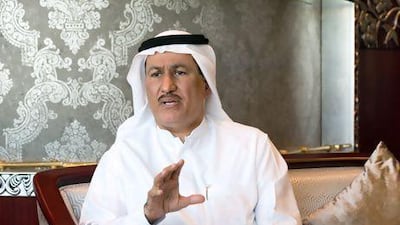Damac is the UAE company most often associated with glitzy property developments, eye-catching marketing stunts ("a free Bentley with every luxury apartment") and, most recently, glamorous golf course projects with Donald Trump.
But in the somewhat spartan Dubai majlis of the founder and chairman, Hussain Sajwani, pride of place is given to a plaque marking its origins in a very different business: "In recognition of outstanding food service performed to the United States army during operation Desert Storm," it reads, a reference to the work Mr Sajwani's firm did during the first Iraq war in 1991.
"We worked for the Americans all over the world, in Somalia, Bosnia and the Gulf, and also for big American companies like Bechtel," says the 57-year-old.
The food business is still part of Damac Group operations and serves both as a reminder of Mr Sajwani's first business expertise and of his ability to cultivate important friends in high places on an international scale.
He is putting those skills to good use again as Damac gears up to take advantage of the recovery in UAE property prices and also considers an initial public offering of shares, with the London Stock Exchange one of the possible IPO venues.
With the early stages of the potential IPO process under way, he is constrained as to what he can say, but concedes: "For a company of our size and our structure, all these options are open. It depends on the advice of the banks. We are talking to several institutions but haven't yet hired one regarding any IPO."
On the reasons for an IPO, still regarded as "hypothetical", he says: "We have cash and bonds as a cushion, and a debt/equity ratio of only 10 per cent. So we don't really need the cash. But it might provide cash for expansion, or it might be a way for the owners to take some money from the business. But all our options are open."
He and his advisers will not speculate on the value of any IPO, but Dubai market professionals have begun talking of a market capitalisation in the single-digit billions of dollars.
That's a long way from the food business, which Mr Sajwani got into in the 1980s, supplying catering services to workers in the energy sector in Abu Dhabi. Despite the US army contracts, the food business was too small, with low margins, for him: "You'd make millions, not billions, in catering," he says.
In 2002, just as Dubai was at the lift-off stage of a six-year real estate boom, he decided property was the future. His family had "dabbled" in property in Dubai, and he had previously developed some mid-market hotels in Deira when the collapse of the Soviet Union led to an influx of visitors from that part of the world.
But the Damac Properties firm that emerged in 2002 was anything but mid-market. It built top-of-the range developments and marketed them aggressively, with off-plan sales as the key to the business model.
Mr Sajwani says he was one of the few to see the crash coming in July 2008: "Sales suddenly dropped dramatically, and when I was told it was because of the summer lull, I knew it was worse than that. We took fast action to cut costs and preserve cash. By May the next year, we were out of the woods and had a cash floor to protect us," he says.
Damac got through the crisis, he says, by careful husbanding of cash, controlling costs, reining in some projects and, when necessary, applying strict measures against buyers in difficulties.
The crisis sparked a string of complaints and legal actions against Damac. Some sued successfully: "Of course, when some customers found they couldn't pay, we had to take the properties back," he says.
Despite some signs that a property "bubble" may be reinflating in Dubai, with rising prices and an increase in off-plan sales, he thinks things are very different now: "Rera [the Dubai property regulator] has imposed tough new conditions on land sales and on escrow accounts. They are very tough, but that's a good thing for Dubai.
"But we have to get rid of the legacy of leverage and greed. Some speculation is good, it's like spice in food, it adds to the taste. But we don't want to be in a situation again where people are 80 per cent leveraged, that isn't good for anybody," he adds.
The Damac property business model now is based on three principles, he explains: "We hold no debts for land. That is always paid 100 per cent at the beginning. Second, escrow accounts are independent. We won't transfer cash from one account to another, so each development supports itself.
"Third, we retain cash reserves, in fixed deposits or government bonds, sufficient so that if the market turns we can support the construction schedule," he adds.
Against the backdrop of Dubai's economic recovery, Mr Sajwani's thoughts are turning again to expansion. Saudi Arabia is one area, with typically upmarket projects in Riyadh and Jeddah well advanced, while Turkey is another "on the radar screen", he says, although there is nothing definite there yet.
In Egypt, he is in the final stages of settling what became an ugly dispute with the government that has rumbled on for the past year, and in Syria he believes "the political situation is difficult".
"I don't see us investing in either country," he says.
Like many family businesses in the Gulf, the issue of succession is also on his mind, and is a possible explanation for the IPO speculation. He says his son, studying in the United States, is "too young" to be involved in the business.
"But anyway we already have a modern corporate structure," he adds.

